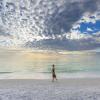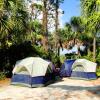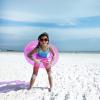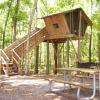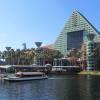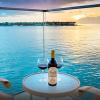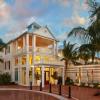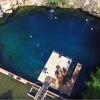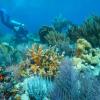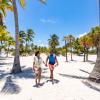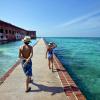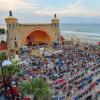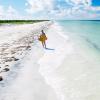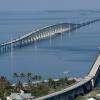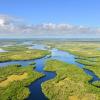By VISIT FLORIDA staff
Things you need to know before your Florida vacation.
Climate
Florida's temperatures generally average from the mid-50s to mid-80s Fahrenheit (about 12 30 Celsius). Temperatures in the northern part of the state occasionally drop to freezing in winter, while South Florida's subtropical areas rarely see frosts or freezes. Summers are very warm and humid, though frequent, brief rain showers provide a refreshing break. The "rainy season" lasts from May through October. Hurricanes occasionally make landfall in Florida during this period; communities within the state have effective emergency plans to assist residents and visitors alike. Though some rainfall does occur at other times of year, late fall, winter and spring are usually sunny, dry and temperate.
What to Pack
Bring cool, comfortable clothing, shorts and casual shirts, sundresses and, of course, bathing suits, tops and sandals. Keep in mind that topless sunbathing and thong-backed bikinis are prohibited in most parts of Florida. Be sure to bring plenty of sunscreen, sunglasses, hats and visors to protect you from the sun. For evening outings, "resort casual" attire (trousers, collared shirts, cotton dresses) is acceptable most places, though gentlemen might consider packing a light sports coat if a more formal evening is planned. While Florida's climate is generally warm all year round, it's a good idea to bring a light jacket if you are travelling here in December through February. Pack insect repellent and an umbrella or a light mackintosh during the rainy season. Don't worry if you forget anything - Florida stores can outfit you with anything you need.
Time zone
Most of Florida is on Eastern Standard Time, which is five hours behind Greenwich Mean Time; the exception being part of Northwest Florida, from just east of Panama City Beach to Pensacola. This part of Florida is in the Central Standard Time zone (one hour earlier). Daylight savings time is in effect from the first Sunday in April through the last Sunday in October. During this period, clocks are set one hour later to maximise daylight hours.
Customs
Visitors over 21 years of age entering the U.S. may bring 1 litre (2 pints) of alcohol, gifts worth up to $100, and 200 cigarettes, 100 cigars or 3 pounds (1.4 kilograms) of tobacco, without paying duty. Cuban cigars and other products of Cuban origin may not be brought into the U.S. All food must be declared to inspectors. A number of food items are prohibited including cheese, fresh fruit and meat products.
There is no limit on the amount of money you may bring with you. However, if you are travelling with more than $10,000 in currency, travellers cheques or other monetary instruments, you must declare it to a Customs Inspector. Failure to do so can result in the confiscation of your money. If two or more people are filing a joint declaration, they should declare the total amount of currency they are carrying. It is not necessary to declare credit cards.
Currency
The dollar is the basic unit of American currency. It is divided into 100 cents. The most common bills are $1, $5, $10, $20, $50 and $100. Older bills are green and mostly look similar, distinguished primarily by their portrait of a different U.S. President. Newer bills integrate different colors, background designs, watermarks and other security features. Commonly used coins are the penny (1 cent), nickel (5 cents), dime (10 cents) and quarter (25 cents). Foreign currency is not accepted.
You can exchange currency at most major airports, banks, at private exchange offices such as American Express or Thomas Cook, and at some hotels. Foreign currency exchange offices at international airports are usually open until the last international flight comes in, Monday through Saturday. Most banks are open Monday to Friday from 9 a.m. to 4 p.m., and some are also open on Saturday mornings.
Travellers cheques are still the safest way to travel with large amounts of money and they are accepted at most locations. Credit cards are widely accepted by hotels, shops, restaurants and car hire companies. Be aware that sales tax (usually 6 to 7 percent) will be added to most prices at shops, restaurants and attractions.
Lost or stolen credit cards or travellers cheques
To report missing credit cards, travellers cheques or travellers cheque cards, call the corresponding freephone numbers:
Credit Cards
American Express: 800-528-4800
Diners Club: 800-234-6377
Discover: 800-347-2683
MasterCard: 800-826-2181
Visa: 800-336-8472
Travellers Cheques
American Express: 800- 221-7282
MasterCard: 800-223-9920
Thomas Cook: 800-223-7373
Visa: 800-227-6811
ATMs
You'll find Automatic Teller Machines (ATMs) in banks, grocery stores, in shopping malls and at many petrol stations.
Using the telephone
To place a call from your hotel, you often must first dial an access code. Check the instructions on the phone, or ask the concierge or front desk clerk for assistance. To reach the police, fire brigade or ambulance, dial 9-1-1. This number is only to be used in a true emergency. Most long-distance and international calls can be dialled directly from any phone.
For calls within the United States and to Canada, dial 1 followed by the area code and the seven-digit number. For international calls, dial 0-1-1 followed by the country code, city code, and the telephone number of the person you are calling. Calls to area codes 800, 888, 866, and 877 are freephone numbers, but a hotel access charge may still apply.
For reversed-charge or collect calls and for person-to-person calls, dial 0 (zero, not the letter "O") followed by the area code and number you want. Specify to the operator that you are calling collect or person-to-person, or both. If your operator-assisted call is international, ask for the overseas operator. For directory assistance within the U.S., dial 4-1-1.
Electricity
The U.S. uses 110-120 volts, 60 cycles is standard. If your small appliances use 220-240 volts, you'll need to bring a voltage converter and a plug adapter with two flat parallel pins.
Weights and measures
The U.S. uses a partial metric and English system of weights and measures. Metric equivalents are:
1 inch = 2.5 centimetres
1 foot (12 inches) = 0.3 meter
1 yard (3 feet) = 0.9 meter
1 mile (5280 feet) = 1.6 kilometres
60 miles per hour = 100 kilometre per hour
1 ounce = 28 grams
1 pound (16 ounces) = 0.45 kilogram
1 quart (liquid) = 0.9 litre.
Holidays
Banks, government offices and post offices are closed on the national Holidays listed below. In addition, some attractions and many stores, restaurants and museums may be closed or have limited hours (call ahead to check).
January 1 (New Year's Day)
the third Monday in January (Martin Luther King Jr. Day)
the third Monday in February (Presidents' Day)
the last Monday in May (Memorial Day)
July 4 (Independence Day)
the first Monday in September (Labour Day)
the second Monday in October (Columbus Day)
November 11 (Veterans' Day)
the fourth Thursday in November (Thanksgiving Day)
December 25 (Christmas)
Dining out/tipping
Some restaurants stop serving dinner as early as 9 or 10 p.m. Call first if you are planning to dine at this time or later.
In the U.S., tipping is a customary reward for good service. In restaurants, bars and nightclubs, tip servers a gratuity of 15% of the total bill (before tax) for good service, or 20% for excellent service. Some restaurants include a gratuity in the amount of the bill so be sure to check or ask your server so you do not overpay.
Tipping is also appropriate at a beauty salon or spa (haircut, manicure, massage, etc., at 15% of total bill); bellhop at hotel or airport ($1 per suitcase); valet ($2 when he delivers your car); taxi driver (15% of fare) and housekeeping service if you are staying at an upscale hotel ($1 - $2 per day of your stay). On package tours, guides and drivers usually get $10 per day from the group as a whole: check whether this has already been figured into your cost and pre-paid. For local sightseeing tours, you may individually tip the driver or guide if he or she has been helpful or informative; the amount is at your discretion.
Smoking Policy
Smoking is illegal in buses and coaches, trains, taxis and in most public buildings in Florida, including establishments that serve food; however, many restaurants have outdoor smoking areas. Hotel rooms are designated as "smoking" and "non-smoking"; request the room type of your choice when making reservations. Bed & Breakfasts generally do not permit smoking inside.
Alcohol Laws
To purchase or consume alcohol in the State of Florida you must be 21 years of age. Proof of age is often requested, so carry photo identification that gives your date of birth. Some grocery stores sell beer and wine (and will also request a photo ID). It is illegal to carry open containers of alcohol in your car or any public area that isn't zoned for alcohol consumption, and it is illegal to drive while intoxicated. Choose a "designated driver" in your group (someone who will abstain from drinking alcohol) who will be responsible for driving you home.
Shopping
Shopping malls are generally open from 10 a.m. to 9 p.m. on weekdays and Saturdays; many large shopping complexes and department stores are open on Sundays from noon to 6 p.m. Smaller, privately owned stores typically open between 9 and 10 a.m. and close between 5 and 6 p.m. from Monday through Saturday.
Travellers with disabilities
Find helpful links and information on travelling with a variety of special needs at www.sath.org, the website of the Society for Accessible Travel & Hospitality, or call the Florida chapter at 561-361-0017.
Disabled parking permits
The Florida Department of Highway Safety and Motor Vehicles will honor any special license plates or parking permits issued to a disabled person by foreign country that issues disabled parking permits that display the international symbol of accessibility. For more information on this and other driving related questions, visit the Florida Department of Highway Safety and Motor Vehicles website.
Health tips
- Protect yourself from the rays of the sun by wearing sunglasses and by applying sunscreen at least 30 minutes before exposure. Use a sunscreen with a Sun Protection Factor of at least SPF 15; SPF 45 for children. Remember to reapply several times during the day, especially after swimming or exercise.
- Dehydration, as well as sunburn, can occur with prolonged exposure to the heat and sun, even in Florida's winter months. Try to arrange most of your outdoor activities before 10 a.m. and after 2 p.m. If you plan to be out all day, carry bottled water. (All drinking water is potable, including tap water.)
- Avoid direct contact with wild animals. When walking in wilderness areas, stay on paths. Be cautious near lakes and ponds since they are prime habitats for alligators. Never feed an alligator or other wild animal.
- Use insect repellent in woodsy areas and parks.
Safety tips
- Always lock your car. Never leave purses, wallets, luggage or other valuables in sight. Lock them in the trunk if you won't be carrying them with you. At night, try to park under a streetlight. Do not leave the car keys inside the car.
- Keep jewelry, cash, cameras, airline tickets, passports and other travel documents and valuables in a hotel safe and keep hotel room keys out of sight. Don't forget to lock your door.
- Carry credit cards and travellers cheques instead of large amounts of cash.
- At public beaches, look for the beach flag system which alerts you to unsafe surf conditions. (Coloured flags on Florida beaches are designed to promote safety by warning beachgoers of water conditions. Blue or green represents calm waters and safe swimming; yellow means mild hazards, including light surf or currents; red warns of highly hazardous conditions; a double-red flag indicates the waters are closed to the public; and purple means marine pests present, which might include jellyfish, stingrays or dangerous fish. The absence of a flag does not necessarily mean the water is safe. Check with a lifeguard to be sure.)
Emergencies
To reach the police, ambulance, or fire brigade in a true emergency, dial 9-1-1 from any phone. For less urgent requests, call the local non-emergency number for the police.
Visitors may want to contact the following sources for more information:
Accommodation
Florida Restaurant and Lodging Association (FRLA)
www.frla.org
Florida Bed and Breakfast Inns
P.O. Box 6187
Palm Harbour, FL 34684-0787
800-524-1880 or 281-499-1374
www.florida-inns.com
Attractions
Florida Attractions Association
114 N. Gadsden St.
Tallahassee, FL 32302
850-222-2885
www.floridaattractions.com
Campsites
Florida Association of RV Parks & Campgrounds
1340 Vickers Dr.
Tallahassee, FL 32303-3041
850-562-7151
www.campflorida.com
Historical Sites
Division of Historical Resources, Florida Dept. of State
R.A. Gray Building
500 S. Bronough St.
Tallahassee, FL 32399-0250
850-245-6300
dos.myflorida.com/historical/
Outdoor Fun
Florida Trail Association
5415 SW 13th St.
Gainesville, FL 32608
877-HIKE-FLA
www.florida-trail.org
Florida Professional Paddlesports Association (FPPA)
www.paddleflausa.com
Sports
Florida Sports Foundation
2930 Kerry Forest Pkwy., Suite 101
Tallahassee, FL 32309
850-488-8347
www.flasports.com
State Forests
Department of Agriculture and Consumer Services, Florida Forest Service
3125 Conner Blvd.
Tallahassee, FL 32399-1650
850-488-6591
www.fdacs.gov
State Parks
Florida State Parks
Mail Station 536
3900 Commonwealth Blvd.
Tallahassee, FL 32399-3000
850-488-9872 or 850-245-2197
www.floridastateparks.org
